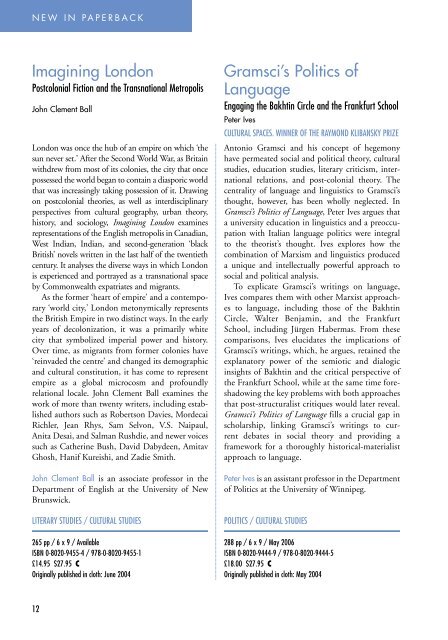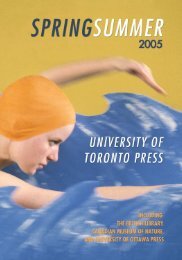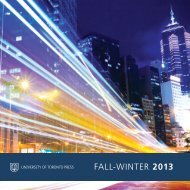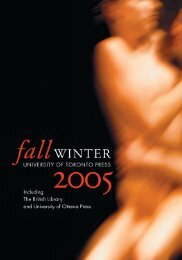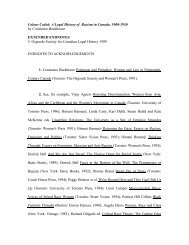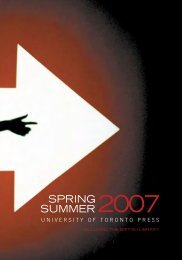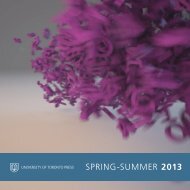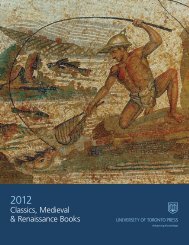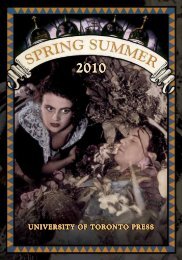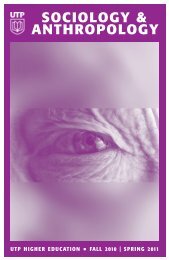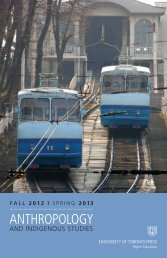Fall/Winter 2006 - University of Toronto Press Publishing
Fall/Winter 2006 - University of Toronto Press Publishing
Fall/Winter 2006 - University of Toronto Press Publishing
Create successful ePaper yourself
Turn your PDF publications into a flip-book with our unique Google optimized e-Paper software.
N E W I N PA P E R B A C K<br />
Imagining London<br />
Postcolonial Fiction and the Transnational Metropolis<br />
John Clement Ball<br />
London was once the hub <strong>of</strong> an empire on which ‘the<br />
sun never set.’ After the Second World War, as Britain<br />
withdrew from most <strong>of</strong> its colonies, the city that once<br />
possessed the world began to contain a diasporic world<br />
that was increasingly taking possession <strong>of</strong> it. Drawing<br />
on postcolonial theories, as well as interdisciplinary<br />
perspectives from cultural geography, urban theory,<br />
history, and sociology, Imagining London examines<br />
representations <strong>of</strong> the English metropolis in Canadian,<br />
West Indian, Indian, and second-generation ‘black<br />
British’ novels written in the last half <strong>of</strong> the twentieth<br />
century. It analyses the diverse ways in which London<br />
is experienced and portrayed as a transnational space<br />
by Commonwealth expatriates and migrants.<br />
As the former ‘heart <strong>of</strong> empire’ and a contemporary<br />
‘world city,’ London metonymically represents<br />
the British Empire in two distinct ways. In the early<br />
years <strong>of</strong> decolonization, it was a primarily white<br />
city that symbolized imperial power and history.<br />
Over time, as migrants from former colonies have<br />
‘reinvaded the centre’ and changed its demographic<br />
and cultural constitution, it has come to represent<br />
empire as a global microcosm and pr<strong>of</strong>oundly<br />
relational locale. John Clement Ball examines the<br />
work <strong>of</strong> more than twenty writers, including established<br />
authors such as Robertson Davies, Mordecai<br />
Richler, Jean Rhys, Sam Selvon, V.S. Naipaul,<br />
Anita Desai, and Salman Rushdie, and newer voices<br />
such as Catherine Bush, David Dabydeen, Amitav<br />
Ghosh, Hanif Kureishi, and Zadie Smith.<br />
John Clement Ball is an associate pr<strong>of</strong>essor in the<br />
Department <strong>of</strong> English at the <strong>University</strong> <strong>of</strong> New<br />
Brunswick.<br />
LITERARY STUDIES / CULTURAL STUDIES<br />
265 pp / 6 x 9 / Available<br />
ISBN 0-8020-9455-4 / 978-0-8020-9455-1<br />
£14.95 $27.95 C<br />
Originally published in cloth: June 2004<br />
Gramsci’s Politics <strong>of</strong><br />
Language<br />
Engaging the Bakhtin Circle and the Frankfurt School<br />
Peter Ives<br />
CULTURAL SPACES. WINNER OF THE RAYMOND KLIBANSKY PRIZE<br />
Antonio Gramsci and his concept <strong>of</strong> hegemony<br />
have permeated social and political theory, cultural<br />
studies, education studies, literary criticism, international<br />
relations, and post-colonial theory. The<br />
centrality <strong>of</strong> language and linguistics to Gramsci’s<br />
thought, however, has been wholly neglected. In<br />
Gramsci’s Politics <strong>of</strong> Language, Peter Ives argues that<br />
a university education in linguistics and a preoccupation<br />
with Italian language politics were integral<br />
to the theorist’s thought. Ives explores how the<br />
combination <strong>of</strong> Marxism and linguistics produced<br />
a unique and intellectually powerful approach to<br />
social and political analysis.<br />
To explicate Gramsci’s writings on language,<br />
Ives compares them with other Marxist approaches<br />
to language, including those <strong>of</strong> the Bakhtin<br />
Circle, Walter Benjamin, and the Frankfurt<br />
School, including Jürgen Habermas. From these<br />
comparisons, Ives elucidates the implications <strong>of</strong><br />
Gramsci’s writings, which, he argues, retained the<br />
explanatory power <strong>of</strong> the semiotic and dialogic<br />
insights <strong>of</strong> Bakhtin and the critical perspective <strong>of</strong><br />
the Frankfurt School, while at the same time foreshadowing<br />
the key problems with both approaches<br />
that post-structuralist critiques would later reveal.<br />
Gramsci’s Politics <strong>of</strong> Language fills a crucial gap in<br />
scholarship, linking Gramsci’s writings to current<br />
debates in social theory and providing a<br />
framework for a thoroughly historical-materialist<br />
approach to language.<br />
Peter Ives is an assistant pr<strong>of</strong>essor in the Department<br />
<strong>of</strong> Politics at the <strong>University</strong> <strong>of</strong> Winnipeg.<br />
POLITICS / CULTURAL STUDIES<br />
288 pp / 6 x 9 / May <strong>2006</strong><br />
ISBN 0-8020-9444-9 / 978-0-8020-9444-5<br />
£18.00 $27.95 C<br />
Originally published in cloth: May 2004<br />
12


